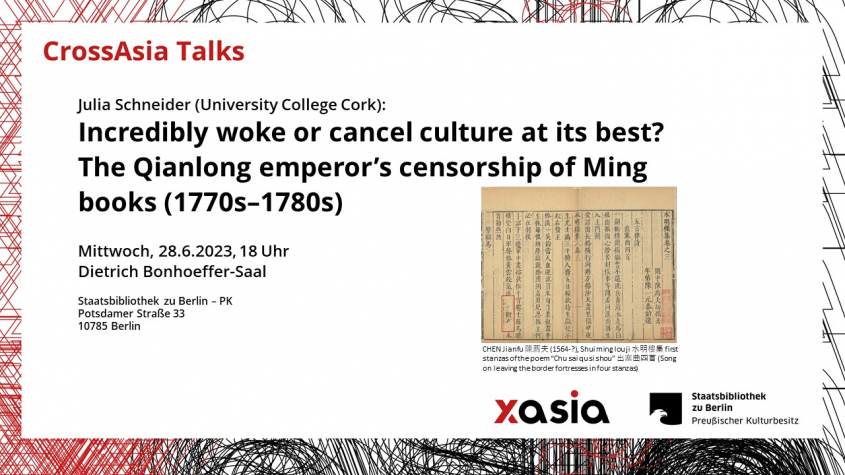CrossAsia Talks: Dr. Julia Schneider 28.6.2023
(See English below)
Wir freuen uns sehr Ihnen den Vortrag von unserer aktuellen Stipendiatin Frau Dr. Julia Schneider (University College Cork) mit dem Titel „Incredibly woke or cancel culture at its best? The Qianlong emperor’s censorship of Ming books (1770s–1780s)“ am Mittwoch, den 28. Juni ab 18 Uhr im Dietrich-Bonhoeffer-Saal (Potsdamer Straße 33, 10785 Berlin) ankündigen zu dürfen. Der Fokus des Vortrags liegt auf der Agenda des Qianlong Kaisers in der sogenannten „Literarischen Inquisition“ (1772–1788) und welche Diskurse nicht-chinesischer Personengruppen in vor allem mingzeitlichen Texten für zensurwürdig erachtet wurden.
Did the Qianlong Emperor of the Manchu Qing Dynasty (1636/1644-1912) issue an anti-racist campaign when he forbade Chinese books that discredited non-Chinese others? In my lecture, I aim to answer this question by introducing passages and terms that made Qing officials collect books for censorship. I focus on the so-called literary inquisition (c. 1772–1788) of the Qianlong emperor which particularly censored books from Ming times (1368–1644). Among other criteria, censors were liable to collect and destroy books that contained partial or derogatory descriptions of the Jurchen (the Manchus’ ancestors), Liaodong (the region of Manchu origin), and non-Chinese peoples in the northwest (the Manchus’ allies).
As a Manchu emperor, the Qianlong emperor belonged to a people that was a numerical minority if compared to the Chinese, the largest constituency among the Qing subject peoples. From an analysis of books that were censored for the above-mentioned reasons we can learn if the Qianlong Emperor indeed attempted to end a hegemonic Chinese discourse on ‘barbarians’ that he perceived as harmful to his dynasty. How did Ming historians understand and narrate non-Chinese history, which of their narratives did Qing censors find worth censoring, and why? A textual analysis of relevant passages in censored books will provide new insights into the Qianlong emperor’s agenda of censorship and his censors’ reading of Chinese discourses on non-Chinese peoples.
Die Vortragssprache ist Englisch. Wir bitten Sie um Voranmeldung für den Vortrag unter: ostasienabt@sbb.spk-berlin.de und eine kurze Mitteilung falls Sie einen barrierefreien Zugang benötigen. Die Veranstaltung wird gefilmt.*
Der Vortrag wird darüber hinaus via Webex gestreamt. Sie können am Vortrag über Ihren Browser ohne Installation einer Software teilnehmen. Klicken Sie dazu unten auf „Zum Vortrag“, folgen dem Link „Über Browser teilnehmen“ und geben Ihren Namen ein.
Alle bislang angekündigten Vorträge finden Sie hier. Die weiteren Termine kündigen wir in unserem Blog und auf unserem Twitteraccount an.
Alle Informationen zum Stipendienprogramm der SPK an der Staatsbibliothek zu Berlin finden Sie hier.
—
We are very pleased to announce the lecture by our grant holder Dr. Julia Schneider (University College Cork) entitled „Incredibly woke or cancel culture at its best? The Qianlong emperor’s censorship of Ming books (1770s-1780s)“ on Wednesday June 28th at 6 pm in the Dietrich-Bonhoeffer-Saal (Potsdamer Straße 33, 10785 Berlin). The focus of the lecture is on the Qianlong Emperor’s agenda in the so-called „Literary Inquisition“ (1772-1788) and which discourses of non-Chinese groups of people were deemed worthy of censorship in mainly Ming-period texts.
Did the Qianlong Emperor of the Manchu Qing Dynasty (1636/1644-1912) issue an anti-racist campaign when he forbade Chinese books that discredited non-Chinese others? In my lecture, I aim to answer this question by introducing passages and terms that made Qing officials collect books for censorship. I focus on the so-called literary inquisition (c. 1772–1788) of the Qianlong emperor which particularly censored books from Ming times (1368–1644). Among other criteria, censors were liable to collect and destroy books that contained partial or derogatory descriptions of the Jurchen (the Manchus’ ancestors), Liaodong (the region of Manchu origin), and non-Chinese peoples in the northwest (the Manchus’ allies).
As a Manchu emperor, the Qianlong emperor belonged to a people that was a numerical minority if compared to the Chinese, the largest constituency among the Qing subject peoples. From an analysis of books that were censored for the above-mentioned reasons we can learn if the Qianlong Emperor indeed attempted to end a hegemonic Chinese discourse on ‘barbarians’ that he perceived as harmful to his dynasty. How did Ming historians understand and narrate non-Chinese history, which of their narratives did Qing censors find worth censoring, and why? A textual analysis of relevant passages in censored books will provide new insights into the Qianlong emperor’s agenda of censorship and his censors’ reading of Chinese discourses on non-Chinese peoples.
The lecture will be held in English. We kindly ask you to register in advance at: ostasienabt@sbb.spk-berlin.de, and to let us know if you need barrier-free access. The event will be filmed.*
The lecture will also be streamed via Webex. You can take part in the lecture using your browser without having to install a special software. Please click on the respective button “To the lecture” below, follow the link “join via browser” (“über Browser teilnehmen”), and enter your name.
You can find all previously announced lectures here. We will announce further dates in our blog and on Twitter.
All information on the SPK research grant programme at the Staatsbibliothek zu Berlin can be found here.

 SBB-PK
SBB-PK
